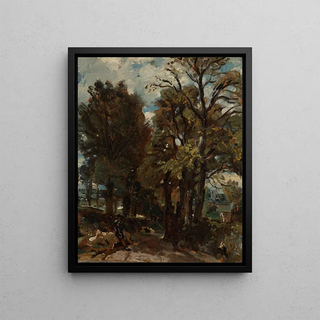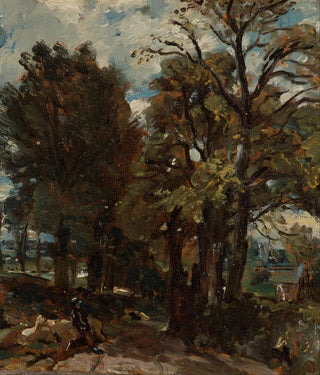Art print | Fen Lane East Bergholt - John Constable


View from behind

Frame (optional)
In the vast panorama of art history, some works manage to capture the essence of a place with such intensity that they transcend the mere pictorial frame. "Fen Lane East Bergholt" by John Constable is one of these creations. Painted in 1821, this canvas evokes not only the natural beauty of English landscapes but also the emotional depth that the artist manages to convey through his brushstrokes. Contemplating this piece, the viewer is immediately transported to the lush fields of Essex, feeling the gentle breeze and the changing light of the sky. The art print Fen Lane East Bergholt - John Constable allows you to relive this sensory experience, offering privileged access to a moment of timeless serenity.
Style and uniqueness of the work
John Constable's style is distinguished by his ability to render nature lively and vibrant. In "Fen Lane East Bergholt," he uses a palette of soft colors and delicate nuances to create a peaceful atmosphere. The meticulous details of the trees, clouds, and fields are rendered with precision that reflects the artist's thorough observation. Constable often sought to capture light and movement, and this work is no exception. The swirling skies, with their shades of blue and white, seem almost tangible, while the lush fields stretch as far as the eye can see, inviting contemplation. The composition, with its harmonious balance between natural elements, reveals an intuitive understanding of space and landscape, making this piece an emblematic example of English romanticism.
The artist and his influence
John Constable, born in 1776, is often regarded as one of the greatest landscape painters in art history. His unique vision of nature profoundly influenced the Romantic movement and paved the way for many subsequent artists. Constable always sought to express his attachment to the English countryside, and "Fen Lane East Bergholt" reflects his love for his native environment. By incorporating autobiographical elements into his landscapes, he was able to create a powerful emotional connection between his work and the viewer. His innovative approach,

Matte finish

View from behind

Frame (optional)
In the vast panorama of art history, some works manage to capture the essence of a place with such intensity that they transcend the mere pictorial frame. "Fen Lane East Bergholt" by John Constable is one of these creations. Painted in 1821, this canvas evokes not only the natural beauty of English landscapes but also the emotional depth that the artist manages to convey through his brushstrokes. Contemplating this piece, the viewer is immediately transported to the lush fields of Essex, feeling the gentle breeze and the changing light of the sky. The art print Fen Lane East Bergholt - John Constable allows you to relive this sensory experience, offering privileged access to a moment of timeless serenity.
Style and uniqueness of the work
John Constable's style is distinguished by his ability to render nature lively and vibrant. In "Fen Lane East Bergholt," he uses a palette of soft colors and delicate nuances to create a peaceful atmosphere. The meticulous details of the trees, clouds, and fields are rendered with precision that reflects the artist's thorough observation. Constable often sought to capture light and movement, and this work is no exception. The swirling skies, with their shades of blue and white, seem almost tangible, while the lush fields stretch as far as the eye can see, inviting contemplation. The composition, with its harmonious balance between natural elements, reveals an intuitive understanding of space and landscape, making this piece an emblematic example of English romanticism.
The artist and his influence
John Constable, born in 1776, is often regarded as one of the greatest landscape painters in art history. His unique vision of nature profoundly influenced the Romantic movement and paved the way for many subsequent artists. Constable always sought to express his attachment to the English countryside, and "Fen Lane East Bergholt" reflects his love for his native environment. By incorporating autobiographical elements into his landscapes, he was able to create a powerful emotional connection between his work and the viewer. His innovative approach,






